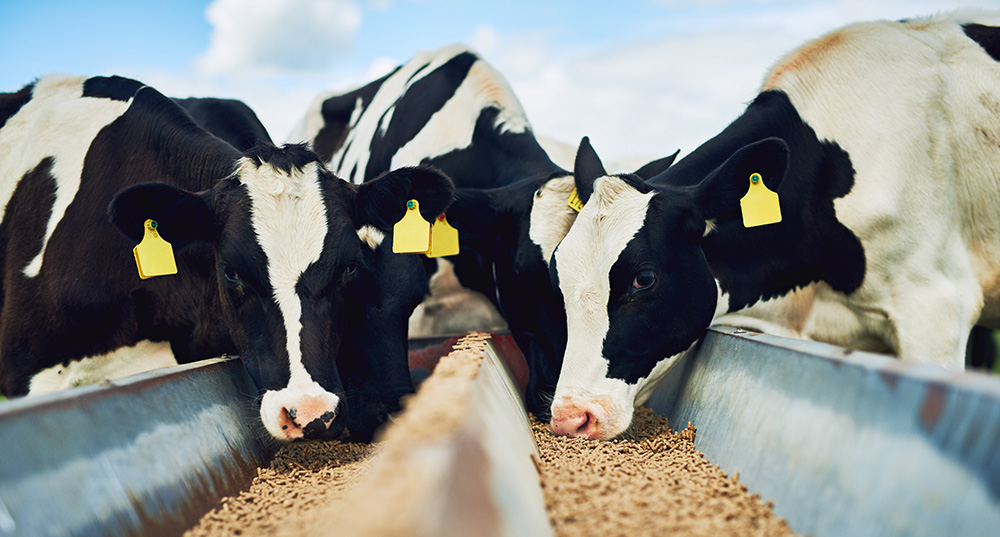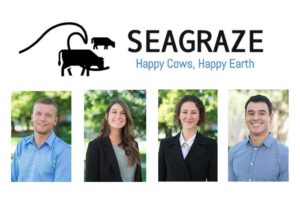Seagraze fights climate changing gas emissions with livestock feed additives

For many of us, a hamburger is a staple of American cuisine, a hot and juicy foundation of summer barbecues, fast-food convenience and deluxe burger-bar indulgences. Delicious as they are, there’s an environmental downside to the dinnertime favorite that’s hard to ignore: About 5.5 pounds of agricultural methane were emitted for each quarter pounder we toss on the grill.
Americans ate more than 27.2 billion pounds of beef last year, according to the U.S. Department of Agriculture. The founders of Seagraze see that figure as testament to the nation’s love for red meat and the staggering environmental cost of that love.
“The American people, they’re not just going to give up eating beef anytime soon,” Seagraze founder Jamie Crowder said. “Instead of kind of shaming people for whatever choice that they make one way or the other. Let’s find a solution that could work for everyone.”
Seagraze’s solution is relatively simple: Give cattle feed with an additive derived from seaweed that cuts cattle’s methane emissions by up to 90 percent. Rather than struggle to change behavior – and threaten an industry that employs more than 825,000 ranchers – the startup hopes to develop consumer-level demand for environmentally friendly beef.
Founded as part of the Impact MBA program’s summer practicum by students Crowder, Brenden Fulton, Ethan Hahn and Katie Ryan, Seagraze is developing a brand that connects shoppers with ranchers who plan to embrace the seaweed additive when it receives final FDA approval. As other companies work to perfect the additive, Seagraze is concentrating on building a brand that leverages environmentally conscious consumers.
Channeling the same purchase motivations behind organic products or packaging certifications similar to the Rainforest Alliance or Free Trade certifications, Seagraze hopes to introduce low-emission beef as a premium product in supermarkets that can fetch increased prices and incentivize ranchers to use feed additives. In the end, everyone wins. Consumers can purchase beef with a clearer conscience and ranchers can earn more per head of cattle – and the environmental impact is achieved without a radical transformation of ranching or eating habits.
“Behavior change is really difficult thing to accomplish, especially when you’re looking at a society like the United States,” Crowder said. “So rather than kind of saying, ‘What can we do to change behavior?’ It’s like, ‘What can we do to educate consumers to make the most sustainable choices?’”
 The consumer education portion of the team’s business plan may be its biggest challenge. While the average shopper is likely aware of carbon’s effects on the environment, methane’s contributions to climate change aren’t as well known.
The consumer education portion of the team’s business plan may be its biggest challenge. While the average shopper is likely aware of carbon’s effects on the environment, methane’s contributions to climate change aren’t as well known.
“It’s really important that the end consumer is aware of the problem, but also takes the initiative to pay a premium to feel a sense of satisfaction that they are helping reduce the amount of methane emissions,” Fulton said.
The venture must also work to overcome the inertia of the ranching industry, a challenge its attempt to develop a premium tier of meat directly addresses. Ranchers who partner with Seagraze aren’t merely getting involved out of the spirit of fighting climate change, but as a bottom-line driven decision.
“We also were told very early on that ranchers are very traditional people. This industry is very traditional,” Hahn said. “From the offset we came in with a very collaborative mindset and trying to find a way that we can share value throughout the supply chain”
The summer practicum is a central piece of the Impact MBA’s social entrepreneurship track. Students identify a social problem to address through the development of a business venture or a nonprofit, then devote their summer to market research, venture development and perfecting their concept. The real-world aspect of the program has led many of its graduates to turn their ventures into full-time jobs after graduation.
The practicum’s focus on using business for a better world also encapsulates the Impact MBA’s vision that corporations that embrace the triple bottom line of people, planet and profit can be forces for social change.
“Our MBA program’s a little bit beam of light,” Ryan said. “It’s like you can still do business, and business can fix the problems that are happening. I refuse to be part of a company that’s making the problems. I want to be part of the part of a business that’s forming solutions.”
If Seagraze can find some traction, she definitely will be part of those solutions.

Seagraze is just one of the ventures in the Impact MBA that is finding new ways to use business to build a better world.
Learn more about sustainable yak wool, Islamic finance and more.